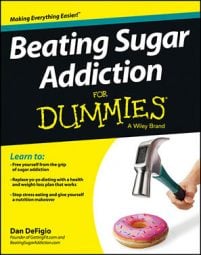No one is perfect, and no one eats perfectly all the time. The good news is you don’t have to! The key to long-term success is to learn how to make good decisions on a regular basis and not to get derailed just because you’ve had a less-than-mindful day.
Start with forgiveness
Mindful eating is a process, a practice that requires, well, practice! You won’t be perfect right off the bat. Being mindful about what you eat doesn’t mean being neurotic, obsessive, or fearful about food.
To heal sugar addiction (or addiction of any type), you have to heal the emotional brain that you’ve taught, unknowingly, to crave something to medicate yourself. It’s not easy; you’re going to have to do some work to stay mindful and build new, healthy habits.
If you make a bad decision or even if you have a whole day of horrible eating, recognize what you did (no excuses), then forgive yourself, with the intention that you’ll do better next time. You’re not a failure, a freak, or a hopeless screw-up.
Due to biology, society, and your past habits and behaviors, you’ve become an addict and you need help. It takes time and practice to undo all that past learning. Cut yourself some slack — no one’s behavior is perfect 100 percent of the time.
There’s a big difference between recognizing a mistake and judging yourself. Scolding yourself only worsens your self-negativity and triggers the emotional insecurities that drive the desire for comfort food in the first place.
Deal with the inner critic
If you’re like most who struggle with addictive personalities, you probably have a well-developed inner critic — the voice continually jabbering away at you, looking for anything to find fault with. It magnifies small failings into giant ones, chastises you over and over for things long past, ignores the true context, and doesn’t credit you for any of your successes. Sound familiar?
What does the inner critic want? It wants to be right. It wants to find evidence to support the same old stories it always tells you. Imagine your inner critic as an obnoxious person at the office who sits around and does nothing except accusingly point at people and say, “See? See, I told you ______!”
Don’t pay any attention to this crazy person. He or she has nothing positive to offer you and is totally out of touch with the facts. That voice is just desperately trying to be right, because that’s its only job description. If it can’t prove it’s right, it gets fired.
That’s right, you can fire your inner critic if you want to! All you have to do is listen objectively to the story or the “evidence” and determine if it’s really true.
Here’s an example of questioning the inner critic’s “evidence”: After a bad food choice, your inner critic shouts, “See? I told you how stupid you are; now you’ve ruined everything!” Is this true? Are you stupid because you made a bad decision? Have you really “ruined everything”?
Certainly not! Successfully beating sugar is a series of ongoing decisions, and you blew one of them. Big deal. You’ll get it right next time; you don’t have to start all over like this character is telling you.
After a few times that the inner critic comes to you with evidence that you determine isn’t true, you can fire it easily and deservedly.
Get back on track: Three easy steps
Because success with low-sugar eating is an ongoing series of small decisions, when you make a bad decision it’s important to be able to get back to making smart ones right away. Follow these three easy steps and you’ll be right back on the wagon:
State what you did without judging, exaggerating, or catastrophizing.
Just the facts, ma’am. Examples might be, “I ate a sweet roll for a snack,” or “I ate a bag of M&Ms.”
State why you did it.
This one is hard because you have to look past any story that you told yourself and reveal the truth. The story may be, “I didn’t have time to eat something healthy.” The real truth is, “I was hungry, and I didn’t bring any good food with me, and I decided I would rather eat the sweet roll than stay hungry.”
State what you intend to do next time.
“Tomorrow I will bring a healthy snack to work.”

